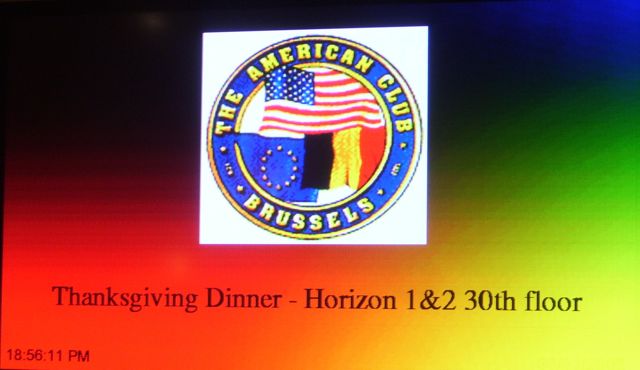27 November 2008

Thanksgiving in the Verenigde Staten is a holiday and a protest. The mood at the dinner hosted by the American Club was celebratory, although rumblings went round during an aggressive invocation I admit I could have done without. I was also a bit disappointed that no mention was made of the terrorist attacks in Mumbai – they suffer (in part) for their friendship with us, no? Granted, I was affected because of personal connections and an upcoming trip. Otherwise, with the exception of the one-dimensional pumpkin pie (!), the company was outstanding and the meal delicious (especially the mushroom and green bean side dish and the perfectly-roasted turkey).

Conversations were typical I guess? Politics. Who’s traveling home for the holidays, who has family traveling here. Why. Why not. Food. Wine. Needing to buy a t-shirt. I got really jazzed when John started to talk about his work as an engineer, especially when he said:
THAT, my friends, is a metaphor for the language-based concept of indexicality!
John makes mongo agricultural equipment. The design gets done somewhere in the US, the product testing gets done somewhere else (I forget), and then John gets to do the actual production. Just like machine shops where I have occasionally interpreted, a significant engineering challenge is to design and build the machine that makes the tool which can generate the exact part which is needed for the machine to be able to do what it is designed to do. That isn’t all we talked about, we also broached working in seven dimensions (and here I thought I was doing good by adding a fourth!), and John and Kathy went totally off on the Bernouli Principle, which, btw, doesn’t apply in supersonic space.
A few days prior to Thanksgiving, I had begun collecting links and thinking about what I might write. The draft I started was titled, mistakes are for learning. The list I compiled of situations we still need to heal included a story on Alaska Governor Sarah Palin’s opposition to American Indian Rights, the illegal occupation of Hawai’i by the U.S. since 1898, books accomplishing more than bombs in Pakistan, the need to work for peace in the Middle East, and the problem so many people still have with lesbian and gay rights.
The whole eclectic collection went out of my head instantly when a pal posted a twitter feed on Facebook as the terrorist attacks in Mumbai commenced in the wee hours of the morning. While relieved that my friends and their friends and families are all ok, I continue to consider that the more people I know the smaller the world becomes. I ache for the people who’ve lost loved ones, and for the families of the terrorists – not all of whom can be happy at what their children have done. Amitav Ghosh has written a thoughtful, clearheaded critique of the rush to compare these attacks to 9/11, reminding us that “9/11” refers
also to its aftermath, in particular to an utterly misconceived military and judicial response, one that has had disastrous consequences around the world.
Consequences. This brings me back around to that concept, indexicality. And the metaphor of a machine shop.
An index is the part of a word or phrase that points to something. Indexing is a referential act, a component of how we make meaning together, the core of what is understood when we achieve understanding. The notion of an index implies time, is perhaps even predicated upon time – at least if we understand time in a granular fashion, as a kind of motion that builds incrementally upon itself, accruing into sediments of meaningfulness. (See, if you can, this BBC documentary, Do You Know What Time It Is? by Professor Brian Cox)
So here’s the deal, as I see it. Our language really matters. What we say has substance. Our words effect the world. We elected Obama: he and his team are leading with language. Yes, they are putting together a centrist adminstration, but think “center” as in core. I’ve rarely been prouder to be American than in being part of Obama’s election, but we’ve got to get past the self-absorbed ways in which we sometimes celebrate being American as if the identity came to us pure. It did not. What is special and unique about America is that despite the terrible tragedies of our history, we absorb the lessons and move on. Now, ‘moving on’ means dealing well with the two extremes of radical diversity and horrific disenfranchisement. The former we must preserve and the latter requires redress.
The core must be solid; the boundaries must be clear. We – every single one of us who believes that there is a chance to finally turn the tide, as Ghosh says, in a long, long battle – we must use the words that signal a future that embraces everyone, instead of words “inviting” those who disagree to step outside the room. It is up to us to listen to the words and phrases of Obama and his team and make them, similar to the language of mathematics, “mean what they say, and say what they mean” (p. 14).